Catalogue > List by artist
Browse the entire list of Rencontre Internationales artists since 2004. Use the alphabetical filter to refine your search. update in progress
Adrian Alecu
Catalogue : 2012Gravitation | Experimental fiction | hdv | color | 3:0 | Romania, Netherlands | 2011
Adrian Alecu
Gravitation
Experimental fiction | hdv | color | 3:0 | Romania, Netherlands | 2011
"GRAVITATION" deals with the idea of European identity and the desire to export it, desire which is deep inside of this identity. A long tradition. It is a tale of mistaken identity and murder, human weakness and individual deficiencies. It is a fatalistic tale of one man?s vain struggle to escape his own limitations, unfortunately an impossibility in the world of noir. The film Gravitation gives me the opportunity to investigate the structuralist film concept, the so-called ?Film Low?. The different actions which in the real life stay under the Nature Low, will have to be in the film under the ?Film Low? : montage, light, perspective, acting, actors and camera choreography and more others film components . Using very reduced but very eloquent / representative objects for the film set will create pictures which have to suggest the acting place. This objects must have a strong relation to the `film place` (typical for the place) so that the viewer, by his visual perception, can be able to trust the authenticity of the picture as a film construction - instead as an illustration. The question for me, is how far I can reduce this elements and on which things, on which elements I have to reduce the decoration of the film `stage` to get the visual suggestion instead of the illustration. That it is one of my research point. The Film will use apparently prosaic structures (narration) but during the editing and the alienation process it has to be percepted as a poetic work. Poetry deals with tempo, with rhythm. In the film, economic tempo and rhythm are matters who belong and are decided more in the editing room. The alienation process is one of the main points in my Film. The Film process have to be transparent, so that film structures and effect modalities will recognize it. I believe that this transparency offers the opportunity to reflect about new modalities of telling a story using the Film. To me, this alienation process helps us to make our `automated` perception - by language and social conventions, more difficult and thereby to get a new vision of the things which can correct our relationship to the environment. Then new forms appear, and this forms and their determinant process become the actual object of artistic perception, in the end the the art subject. Using a linear visual guided treatment will permit to give up a psychological motivation, and to make the non-artistic interpretations harder. The Sound will have a strict autonomous function in Film, and will try so much possible to not be used as a naturalistic synchronic language.
Born at 20 Mai 1972 in Bucharest / Romania EDUCATION 1990 2008 2011 Liceul ?Spiru Haret?, Bucharest / Romania Diplom in Art studies at the University of Fine Arts of Hamburg Jan van Eyck Academie post-Academic Institute for Research and Production Fine Art, Design, Theory, Maastricht / The Netherlands
Lee Alex
Catalogue : 2022the Fold | Experimental VR | mp4 | color | 0:0 | USA | 2019
Lee Alex
the Fold
Experimental VR | mp4 | color | 0:0 | USA | 2019
"The Fold" is a non-linear film and virtual reality-based art game involving rooms with doors containing a concept folding into other rooms with doors. Inspired by Jorge Luis Borges' short story The Garden of Forking Paths, each room consists of an idea inspired by structuralist & surrealist literature, mathematics, the readymade virtual object, and more. This project is a virtual 'escape the room' concept where some rooms are puzzle experiences and others are more experiential. All rooms follow a similar visual monochromatic motif. To date, the project involves five rooms: the Doors, the Fold, the Grid, the Meridies, and the Cave. Subsequent rooms will be released as this project is a long-term episodic series. Chapter one is debuted at Berlin Recontres International.
Alex M. Lee is an artist who utilizes 3D animation, video game engines, virtual/augmented/immersive reality platforms, and the potential of simulation technologies in order to visualize and complicate our perception of time, space, image and light - culling from concepts within science, science fiction, physics, philosophy, and modernity. He received his BFA (2005) and MFA (2009) from the School of the Art Institute of Chicago. Born in Seoul, South Korea, Lee was raised in the USA and is associate professor in the Digital Arts & Sciences Program at Clarkson University located in Potsdam, NY - a private science and engineering university located north of the Adirondack Mountains where he divides his time between Potsdam and New York City. Lee has exhibited internationally in North America and Asia. Selected exhibitions include: Mio Photo, Osaka, Japan; Daegu Art Factory, Daegu, Korea; The Gene Siskel Film Center, Chicago, Illinois; Eyebeam: Center for Art & Technology, New York, NY; Gallery DOS, Seoul, Korea; Museum of Contemporary Art, Montreal, QC. His work has been published in articles covering art, science, and culture including: Metaverse Creativity, Canadian Art, and Routledge Press.
Amy Alexander
Catalogue : 2022What the Robot Saw | Multimedia installation | 0 | color | 0:0 | USA | 2020
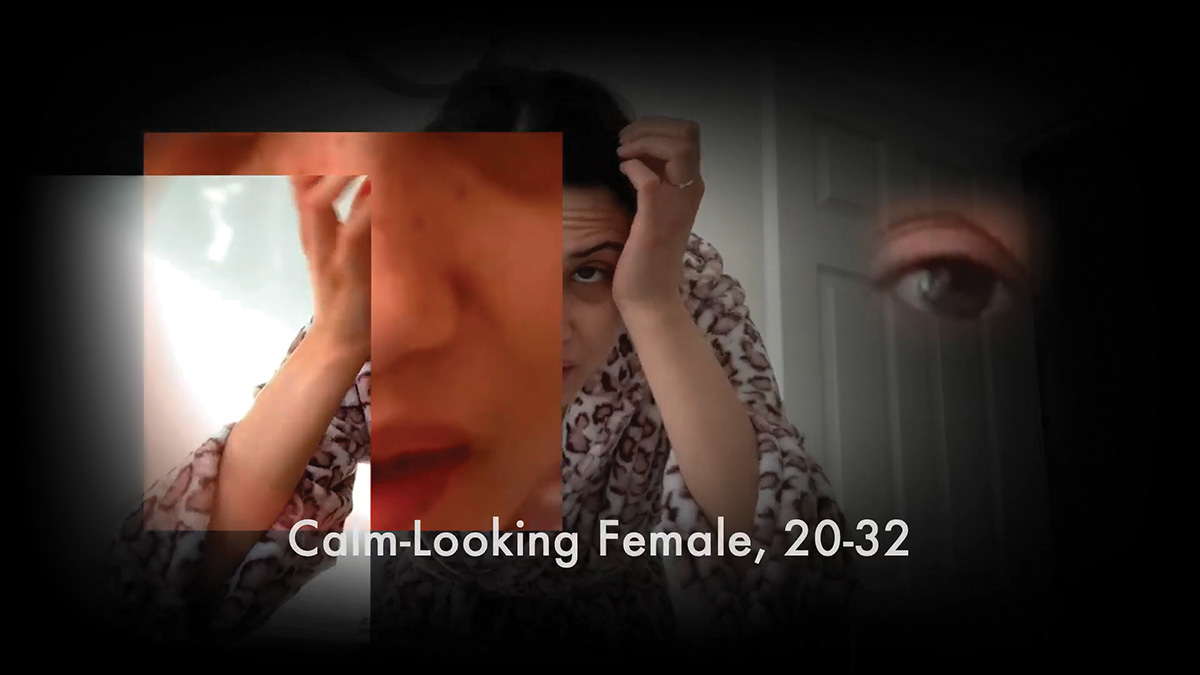
Amy Alexander
What the Robot Saw
Multimedia installation | 0 | color | 0:0 | USA | 2020
An invisible audience of software robots continually analyze content on the Internet. Political trolls and YouTube celebrities gain visibility because social media ranking algorithms promote addictive videos to the top of search and recommendation rankings. What the Robot Saw is a continuously-generated livestream film that uses contrarian algorithms to constantly curate some of the least attention-grabbing videos recently uploaded to YouTube. These videos, and their creators, are rendered largely invisible by social media algorithms. Their primary audience may be the robots that rank them. What the Robot Saw uses computer vision algorithms to curate videos and study their subjects. It focuses on first-person, camera facing narrators. The robot continually assembles its film and labels its “talking head” performers in a robo-fantastical cinematic style. The Robot titles its human subjects according to the demographically-focused feature set of Amazon Rekognition, a popular facial analysis system. In a robot-centric world, attributes like presumed age, gender, and emotion might better identify us than our names. The title is a reference to early 1900s What the Butler Saw “peep show” films. Both the butlers and the Robot got a superficial glimpse of a seductive “show;” they could not really understand the objects of their obsession.
Amy Alexander is a professor and hackernaut who has been making computationally-based art projects since the 1990s. Amy is a Professor of Computing in the Arts in the Visual Arts Department at UC San Diego. She is an algorithmic filmmaker and performer who has focused throughout her career on the fuzzy borders between media and the world. Amy’s work has frequently addressed algorithmic subjectivity in digital culture by creating transparently biased, sometimes funny alternatives. Her latest project returns to this theme — this time taking on the attention economy and social influence of algorithms used for social media rankings and facial classification. Using computer vision and machine learning-based methods of curation and production, What the Robot Saw, is a perpetual live stream that depicts the cinematic fantasy of the surveillant AI robots who “see” the social media content few humans get to experience. Amy’s art practice has spanned net art, software art, computationally-based installation, audiovisual performance, and film. Her research and practice over the years has focused on how contemporary media – from performative cinema to social media – changes along with cultural and technological shifts. Amy’s projects have been presented on the Internet, in clubs and on the street as well as in festivals and museums. She has written and lectured on software art, software as culture, and historical and contemporary audiovisual performance. She has served as a reviewer for festivals and commissions for new media art and computer music.Her recent lectures span topics including algorithmic bias and subjectivity, cultural anthropologies of gender roles in 20th and 21st century computing, and systems and disruption in 20th and 21st century media.
Greta Alfaro
Catalogue : 2020He Had Got Certain Vibes | Video | hdv | color | 2:31 | Spain, United Kingdom | 2019
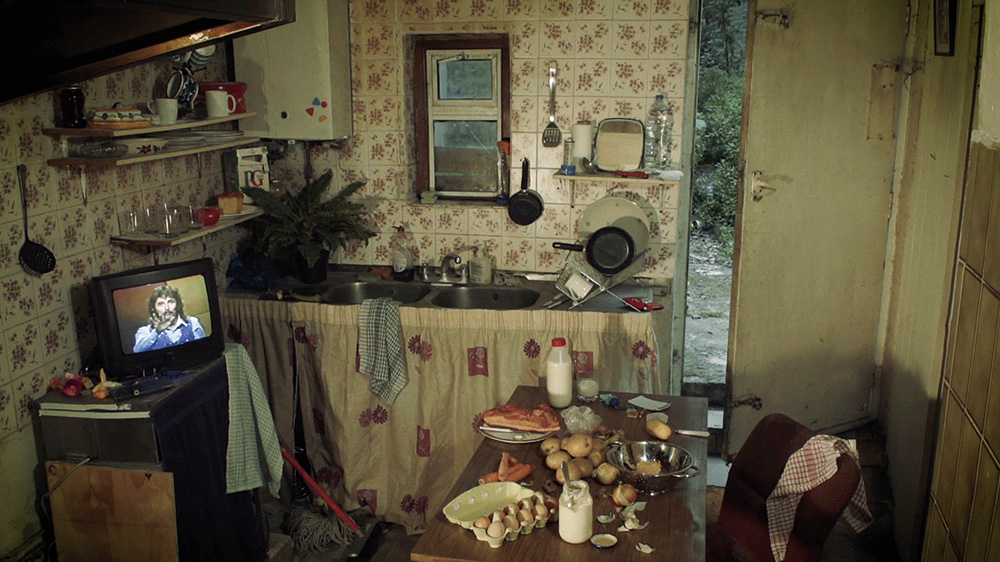
Greta Alfaro
He Had Got Certain Vibes
Video | hdv | color | 2:31 | Spain, United Kingdom | 2019
One still life of the 20th Century. Poverty, mental health, media and magic. The fragility and drama of the everyday and domesticity.
Greta Alfaro (Spain, 1977) is a visual artist. Her solo exhibitions include Decimocuarta estación (2019) at the Fundación BBVA, Madrid; In Ictu Oculi (2019) at the Flint Institute of Arts, Michigan; El cataclismo nos alcanzará impávidos (2015) and European DarkRoom (2014) at Galería Rosa Santos, Valencia; Still Life with Books (2014) at Artium, Vitoria; In Praise of the Beast (2013) at Hiroshima City Museum of Contemporary Art, Japan; and Invención (2012) at Ex Teresa, Mexico City. Among her other solo site-specific projects are I Will Not Hesitate to React Spiritually (2019), with Roaming Room, and A Very Crafty and Tricky Contrivance (2012), with Genesis Foundation, both in London, and Comedias a honor y gloria (2016) in La Gallera, Valencia. She has taken part in numerous group shows and festivals in venues like the Whitechapel Gallery, Institute of Contemporary Arts and Saatchi Gallery in London; Centro Cultural Banco do Brasil in Brasilia; The Bass Museum of Art in Miami; the Conciergerie in Paris; Künstlerhaus Bethanien in Berlin; La Casa Encendida in Madrid or the International Film Festival Rotterdam.
Catalogue : 2011In Ictu Oculi | Art vidéo | dv | color | 10:35 | Spain | 2009
Greta Alfaro
In Ictu Oculi
Art vidéo | dv | color | 10:35 | Spain | 2009
There is a table in the middle of the countryside, but the guests are absent. There is a feast of food and wine waiting in the cold weather and the dry landscape. The vultures are to come and eat our food and destroy our setting: the still life, the banquet, the space of enjoyment and civilization. The vultures, the beasts linked to death and dirt, to violence and fear, arrive by surprise, and like in a fable, represent for us some of our own qualities.
Greta Alfaro (Spain, 1977) is currently studying an MA in Photography at the Royal College of Art, London. In recent years she has been the recipient of several grants and scholarships among which are Matadero-City Council of Madrid, Casa de Velázquez, Fundación BilbaoArte, the Government of Mexico or the Genesis Foundation. She is taking part in the exhibition Bloomberg New Contemporaries 2010 at the ICA, London, and her recent solo shows include In Ictu Oculi, in Galería Marta Cervera, Madrid and Carpe Diem, Lisbon, and Elogio de la Bestia, in Centro de Arte Contemporáneo Huarte, Spain.
Pierre Alferi
Catalogue : 2007Mots croisés | Experimental video | dv | color | 2:45 | France | 2006

Pierre Alferi, Jacques JULIEN
Mots croisés
Experimental video | dv | color | 2:45 | France | 2006
Pierre Alféri est né à Paris en 1963. Il a fondé la revue `Détail` avec Suzanne Doppelt et est également co-fondateur de `La revue littéraire générale` avec Olivier Cadiot. Il est pensionnaire de l`Académie de France à Rome entre 1987 et 1988 et `écrivain résident` de la Fondation Royaumont entre 1991 et 1992. Pierre Alféri possède de nombreuses casquettes : il est à la fois romancier, traducteur d`ouvrages américains et russes, essayiste et poète.
Catalogue : 2006In time | Experimental video | dv | color | 16:30 | France | 2005
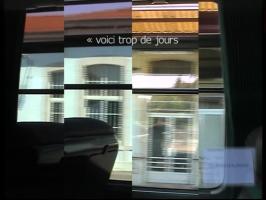
Pierre Alferi
In time
Experimental video | dv | color | 16:30 | France | 2005
Intime, de Pierre Alféri est un travail à la fois littéraire et vidéopoétique, où l`espace du voyage est celui de la langue. C`est une traversée en images, traversée de lieux et de paysages, et en mots, lettres adrésées à des anonymes, qui dépouillés de leur "moi" sont dépeints comme des caractères. L`intime n`est donc pas celui du "moi" de l`être mais naît du déséquilibre crée par les mots, qui tissent alors des liens rendus nécessaires entre les personnages.
Pierre Alféri est né à Paris en 1963. Il a fondé la revue `Détail` avec Suzanne Doppelt et est également co-fondateur de `La revue littéraire générale` avec Olivier Cadiot. Il est pensionnaire de l`Académie de France à Rome entre 1987 et 1988 et `écrivain résident` de la Fondation Royaumont entre 1991 et 1992. Pierre Alféri possède de nombreuses casquettes : il est à la fois romancier, traducteur d`ouvrages américains et russes, essayiste et poète.
Pierre Alferi, Jacques JULIEN
Catalogue : 2007Mots croisés | Experimental video | dv | color | 2:45 | France | 2006

Pierre Alferi, Jacques JULIEN
Mots croisés
Experimental video | dv | color | 2:45 | France | 2006
Pierre Alféri est né à Paris en 1963. Il a fondé la revue `Détail` avec Suzanne Doppelt et est également co-fondateur de `La revue littéraire générale` avec Olivier Cadiot. Il est pensionnaire de l`Académie de France à Rome entre 1987 et 1988 et `écrivain résident` de la Fondation Royaumont entre 1991 et 1992. Pierre Alféri possède de nombreuses casquettes : il est à la fois romancier, traducteur d`ouvrages américains et russes, essayiste et poète.
Catalogue : 2006In time | Experimental video | dv | color | 16:30 | France | 2005

Pierre Alferi
In time
Experimental video | dv | color | 16:30 | France | 2005
Intime, de Pierre Alféri est un travail à la fois littéraire et vidéopoétique, où l`espace du voyage est celui de la langue. C`est une traversée en images, traversée de lieux et de paysages, et en mots, lettres adrésées à des anonymes, qui dépouillés de leur "moi" sont dépeints comme des caractères. L`intime n`est donc pas celui du "moi" de l`être mais naît du déséquilibre crée par les mots, qui tissent alors des liens rendus nécessaires entre les personnages.
Pierre Alféri est né à Paris en 1963. Il a fondé la revue `Détail` avec Suzanne Doppelt et est également co-fondateur de `La revue littéraire générale` avec Olivier Cadiot. Il est pensionnaire de l`Académie de France à Rome entre 1987 et 1988 et `écrivain résident` de la Fondation Royaumont entre 1991 et 1992. Pierre Alféri possède de nombreuses casquettes : il est à la fois romancier, traducteur d`ouvrages américains et russes, essayiste et poète.
Abu Ali
Catalogue : 2011al barzaj | Video | dv | color | 14:0 | Spain, Morocco | 2010
Abu Ali
al barzaj
Video | dv | color | 14:0 | Spain, Morocco | 2010
Catalogue : 2008Los Sures | Experimental doc. | dv | color | 12:0 | Spain, USA | 2007
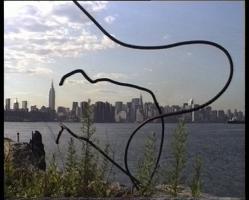
Abu Ali
Los Sures
Experimental doc. | dv | color | 12:0 | Spain, USA | 2007
Los Sures, in its first level is a detournement in the Souths street area in Brooklyn New York, its waterfront, its wastelands, its people; a tough and poor area of a megalopolis. But over all, this tape is a inner trip in a landscape of symbols and metaphors emerged from the daily life, a trip though a innerscape of desolation and celebrations of life.
Toni Serra * Abu Ali Barcelona 1960. Lives in between Duar Msuar (Morocco) and Barcelona (Spain). videos, mass-media archaeology, video-installation, interactives,.. Most of my works are positioned on a tense line between the inner experience...and the social field dominated by a growing dispositives of control, manipulation of identities and communities. This exploration meets issues as: erasing and constructing identities through the media (The TV Code Series), constructing realities through video games and ?expanded reality? (Babylon Archives ? The War Room),...the ?ritual climax? and the interzone space of the dreams as a doors to ?other realities? as well as realities of the ?other?. I am also a founder member of OVNI Archives - Observatorio de Video No Identificado (www.desorg.org), where I am doing research and programming: - Exodus, The Margins of the Empire - Colonial Dream and Autononous Zones, - Resistances, - Post Sept 11th, - Communities, - Media vs Identity, Other programms curated: - TransArab - City Unrest - (...)
Kamal Aljafari
Catalogue : 2025UNDR | Experimental film | hdv | color and b&w | 15:0 | Germany | 2024
Kamal Aljafari
UNDR
Experimental film | hdv | color and b&w | 15:0 | Germany | 2024
The camera's eye returns obsessively to the same places, a vertical perspective that imposes control, the possession of archaeological sites, stones lying for thousands years in the desert. The places it observes, however, are not deserted: we see, as if glimpsed from afar, the peasants working the land, themselves transformed into landscape. Something disturbs the stillness of the place: explosions on land and in the sea prepare the ground for new cities with new names, new forests. This landscape is transformed into a scenography of appropriation.
Palestinian filmmaker Kamal Aljafari studied at the Kunsthochschule für Medien Köln and currently lives in Berlin. He has taught filmmaking at The New School (New York) and the DFFB (Berlin). He is a fellow at the Institute for Ideas and Imagination of Columbia University. In May 2024, IndieLisboa dedicated a retrospective to his work. In 2024 his film UNDR was selected at IFFR and A Fidai Film at Visions du Réel, where it won the Grand Jury Prize Burning Lights Competition. Aljafari is currently working on a fiction film to be shot in Jaffa.
Bassam Alkhouri
Catalogue : 2007Untitled | Experimental video | dv | color | 2:35 | Syria | 2005

Bassam Alkhouri
Untitled
Experimental video | dv | color | 2:35 | Syria | 2005
More and more we communicate through our own way of thinking, without trying to understand the mentality, background, or politics of the 'other' one. "Untitled": he's standing behind the window, using all his senses. In comes dialogue.
Bassam Youssef Alkhouri is an artist originally from Katana, Syria. He has a Bachelor of Visual Communication from the Academy of Fine Arts, Damascus, Syrai, where he studied from 1988 to 1993, and a Postgraduate Research & Practice in Art from the Dutch Art Institute, Enschede, The Netherlands, where he studied from 2003 to 2005. His exhibitions include: May 2006 - "Here as the center of the world", Dutch Art Institute, NIASD Damascus, Syria; May/June 2006 - La 6eme edition des journees de la photographie de Damas, Le Centre culturel francais de Damas, Damascus, Syria; March 2006 - Festival International d?Art Video Casablanca, Morrocco; May 2005 - Open Daizzz Dutch Art Institute, Enschede, The Netherlands; A Consumption of Justice Arts Center Dyarbakir, Art Gallery of the Greater Municipality of Diyarbakir, Turkey; April 2005 - Arts Centre, Dyarbakir, Turkey; November 2004 - Crossing The Border Opstandingskerk, Enschede, The Netherlands; April 2004 - The Big Communication Nanjing Art Academy, China; March 2003 - Howden Festival, East Yorkshire, England; April 2003 - Assyrian New Year Convention City Hall, Hengelo, The Netherlands; March 2002 - AL-Tajalliat (The Visions) Holy cross halls, Damascus, Syria; Sept. 2000 - Darat Al Funun The Arts Home, Amman, Jordan; May 2000 - Passion Week, The Armenian Church, Damascus, Syria; May 1997 - Passion Week, The Round Theatre, Damascus, Syria; Jan. 1994 - Many and Almanawia Goethe Institute, Damascus, Syria. Since Alkhouri's arrival in The Netherlands in 2004, he has become interested in working with video, derived from his experiences of daily life.
Emanuel Almborg
Catalogue : 2009Newsreel | Art vidéo | dv | color | 8:50 | Sweden | 2008

Emanuel Almborg
Newsreel
Art vidéo | dv | color | 8:50 | Sweden | 2008
Newsreel can be seen as an attempt to depict and deconstruct the aesthetics of TV news with a starting point in a real Swedish Channel 4 news broadcast. Today news play a big role in our everyday lives. We become more and more dependent on and use to news medias informative qualities. They make us aware of our surrounding world and the global debate. At the same time one could argue that the news broadcast often rests upon a narrative structure that can be traced back trough the history of cinema. Newsreel try?s to explore, if and how the newsreader, the studio set, and the structure of the news broadcast relates to narratological rules and what happens if one breaks them. If the purpose with news is to inform us in an intelligible way about important and urgent issues and events, I want to take a starting point in what makes something intelligible and open up for the bigger question; what is intelligibility? By separating news from the effective method that communicates its content I want to create the possibility to take a step back and look at the news broadcast in a different way.
Emanuel almborg www.sakerna.se/emanuel Born in Stockholm, Sweden 1981, lives and works in London and Stockholm. Education: 2005 ? 2007 MFA, Fine art Goldsmiths College, London 2001 - 2004 BA, Fine art Konstfack, Stockholm Selected Group Exhibitions and Solo Shows: 2008 MI2 B.I.G ProjectSpace, K44, Athens 2008 Loop international festival and fair for video art, Barcelona 2008 Videotheque Sala Rekalde, Bilbao 2008 Auction in a suitcase, 1:1 projects, Rome 2007 One must be so careful these days. Alma Enterprises, London 2007 MFA Degree show, Goldsmiths College, London 2007 Michael Poppyfield projects, Cal Arts, Los Angeles 2006 Goldsmiths MFA survey, Gallery white Box, New York 2006 Rag and Bone, Three Colts Gallery, London 2006 The Union, Collaborative project at Gallery Meals & SUVs, London 2005 Sakerna, magazine/installation, Stockholm ArtFair, Stockholm 2004 Been Here Too Long, Video, Gallery SAK, Stockholm 2004 The Second City, Video, Group show at Kulturhuset (Culture House) Stockholm 2003 Första Saken, Collaborative project at Gallery Konstfack, Stockholm 2002 Hyères Festival des arts de la Mode, France Other Projects: 2007 Artist Clothing at Tensta konsthall, photographer for project. Catalogue and poster. 2005 Beckmans Initiator/Tutor for workshop at Beckmans college Stockholm. 2004 Andra Saken Magazine (Distributed around the world) 2003 Första Saken Magazine (Distributed around the world) 2004 www.sakerna.se Website 2003-2006 Founder, Editor, Photographer, filmmaker, Sakerna Magazine and Project (www.sakerna.se) Selected Bibliography: 2006 Sede, (Magazine) 2006 Influences, Die Gestalten Verlag (collection of art/desig book) 2005 Übersee, Die Gestalten Verlag (collection of art/design Book) 2002 Super, Die Gestalten Verlag (collection of art/design Book) 2001 Desire, Steidl (collection of photography Book)
Bon Alog
Catalogue : 2018Summa summarum | Experimental film | hdv | color | 5:46 | Lithuania | 2017
Bon Alog
Summa summarum
Experimental film | hdv | color | 5:46 | Lithuania | 2017
The characteristics of our subconsciousness has its own model of reality. Human-being is trying to distinguish where simulation starts and ends. But the self-reflection of consciousness is full of absurdity itself... What is REAL? And what is REALLY happening?
2015 - present BA in Photography and Media art, Vilnius Academy of Arts (Lithuania) 2017.10 - 2018.02 Photography and Time-based arts, Bucharest national university of Arts (Romania) 2009 - 2013 BA in Creative industries, Vilnius Gediminas technical university (Lithuania) 2012 Spring semester - Multimedia, Tomas Bata university (Czech Republic)
Basma Alsharif
Catalogue : 2010we began by measuring distance | Experimental video | dv | color | 19:0 | Palestine, Egypt | 2009
Basma Alsharif
we began by measuring distance
Experimental video | dv | color | 19:0 | Palestine, Egypt | 2009
Long still frames, text, language, and sound are weaved together to unfold the narrative of an anonymous group who fill their time by measuring distance. Innocent measurements transition into political ones, drawing to an examination of how image and sound communicate history, tragedy, and the complication of Palestinian nationalism. The work explores an ultimate disenchantment with facts when the visual fails to communicate the tragic.
Born 27 august 1983 in Kuwait. Spent early childhood in Brittany France. Educated in the US, earning BFA & MFA from the University of Illinois at Chicago School of Art & Design and was a guest student at the Malmö Art Academy, Lund University Sweden in 2004. Taught as an adjunct instructor at The University of Illinois at Chicago, The School of the Art Institute of Chicago, and the American University in Cairo. Currently based in Beirut Lebanon as a recipient of the Fundación Marcelino Botín Visual Arts Grant 2009-2010 developing a series of new projects in photography, film, and text.
Udval Altangerel
Catalogue : 2023The Wind Carries Us Home | Experimental doc. | mov | color | 11:11 | Mongolia | 2022
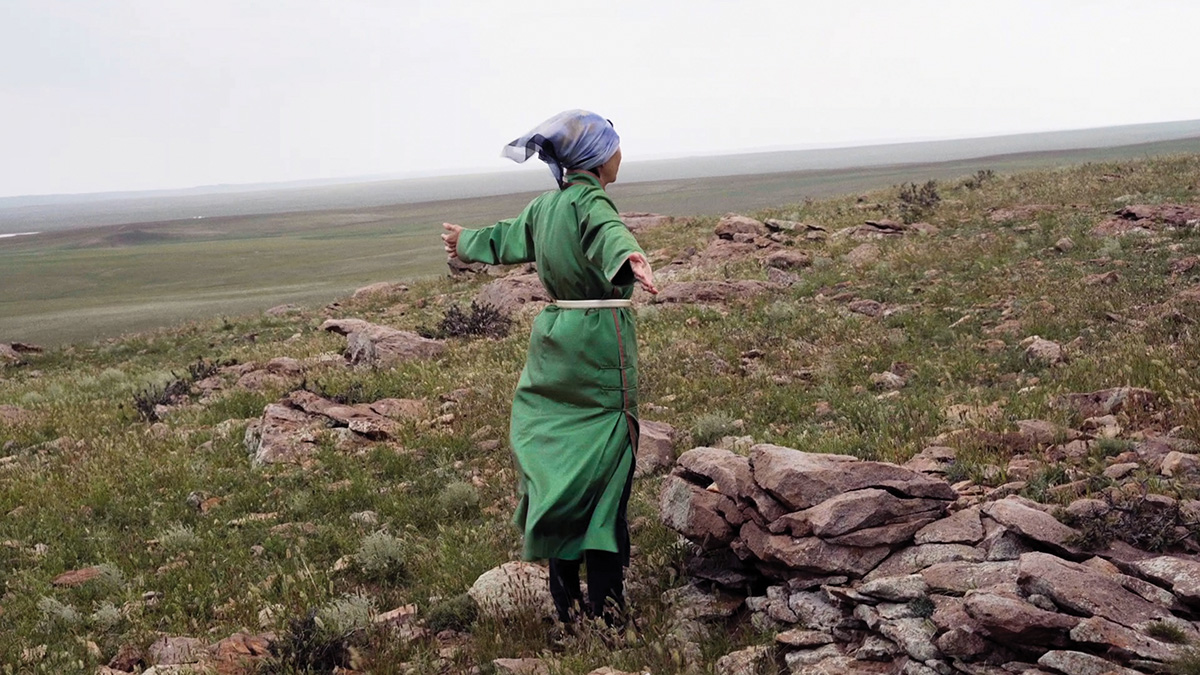
Udval Altangerel
The Wind Carries Us Home
Experimental doc. | mov | color | 11:11 | Mongolia | 2022
Through rituals of birth and death, the filmmaker and her family reconnect with their ancestral land in the Gobi Desert.
Udval Altangerel is a Mongolian filmmaker based between Ulaanbaatar and Los Angeles. In her work she explores the themes of personal and national histories, language, and (home)land. Her work has screened at Locarno Film Festival, Images Festival, Alchemy Film & Moving Image Festival, and Tacoma Film Festival, where she received Honorable Mention for Best Documentary Short Film. She was selected to participate in Locarno Open Doors and the Flaherty Film Seminar. Udval received her MFA in Film Directing from California Institute of the Arts.
Fabian Altenried
Catalogue : 20181000 Smiles Per Hour | Experimental fiction | 4k | black and white | 15:0 | Germany | 2016
Fabian Altenried
1000 Smiles Per Hour
Experimental fiction | 4k | black and white | 15:0 | Germany | 2016
1000 Smiles Per Hour follows a androgynous jester for one day and one night through a decaying sea side town. Drifting across the outer edges of a concrete landscape, a twilight meeting engenders a precious moment of connection for the melancholy performer, amid the coldly apathetic city limits.
Fabian Altenried (*1987) is a director, writer and producer. He studied visual art at the Art Academy in Düsseldorf and philosophy in Berlin. Since 2013 he is part of the Berlin based independent production company Schuldenberg Films. His conceptual approach stems from his engagement with post-structuralism, identity and gender theories, performativity, theories of animality, and post-ideological leftism. Fabian has been an artist in residence of Gargonza Arts in 2013, a participant of Feature Expanded 2016 and Berlinale Talents 2017. His works have been supported by the FFA, werkleitz e.V., the Arts Foundation of North Rhine Westphalia, the Stiftung Kunstfonds, the Mondriaan Fonds et al. and have been shown at the Berlinale, the Sarajevo Film Festival, in Edinburgh, Rotterdam, and many other festivals and shows globally.
Ricardo Alves Jr
Catalogue : 2012PERMANÊNCIAS | Experimental doc. | hdcam | color | 34:0 | Brazil | 2010
Ricardo Alves Jr
PERMANÊNCIAS
Experimental doc. | hdcam | color | 34:0 | Brazil | 2010
From the inside the air is heavier
Ricardo Alves Jr was born in Belo Horizonte, Brazil. Graduated in Film Direction at Universidad del Cine in Buenos Aires, Argentina. His first work, the short movie "Material Bruto" (Raw material), received over 10 awards at international festivals, besides being selected for the "Video Zone" at the International Video Art Biennial of Israel and VideoBrasil. "Convite para jantar com camarada Stalin" (Invitation to dinner with Comrade Stalin, 2007), Ricardo`s second work, won the award for Best Experimental Short Film at the International Short Film Festival of Rio de Janeiro; Best Short Film, Best Director and Photography at the 40th Film Festival of Brasilia, plus Special Mention "Film of Tomorrow" at the International Festival of Short Films, in Belo Horizonte. He?s participated in over 30 international film festivals such as Oberhausen, Rotterdam, Karloy Vary, Paris Cinema, Munich, and Torino Film Festival. In 2011 Ricardo released his third film entitled "Permanences", official selection at Cannes Critic?s Week.
Ricardo Alves Junior
Catalogue : 2011Convite para jantar com o camarada Stalin | Fiction | 16mm | color | 10:0 | Brazil | 2007
Ricardo Alves Junior
Convite para jantar com o camarada Stalin
Fiction | 16mm | color | 10:0 | Brazil | 2007
Two elderly sisters spend their last days together. Between dreams and death, Olga and Marilu await a dinner guest.
Ricardo Alves Júnior was borned in Belo Horizonte, Brazil. Graduated in Film Direction, at Universidad del Cine in Buenos Aires, Argentina. His first work, the short movie "Material Bruto" (Raw material), received over 10 awards at festivals in Bolivia, Brazil and Portugal, besides being selected to the "Video Zone" at International Video Art Biennial of Israel and VideoBrasil. "Convite para jantar com camarada Stalin" (2007), Ricardo's second work, won the award for Best Experimental Short Film (International Short Film Festival of Rio de Janeiro); best short film in 16mm, best direction and photography in the 40th Film Festival of Brasilia, and won the special mention "Film of Tomorrow" in the International Festival of Short Films, in Belo Horizonte. Participated in 20 international film festivals such as Oberhausen Film Festival, Rotterdam Film Festival, Karloy Vary Film Festival, Paris Cinema, Munich International School of Film and Torino Film Festival.
Ulf Aminde
Catalogue : 2007Welcome Home | Video installation | dv | color | 12:0 | Germany, Belgium | 2006
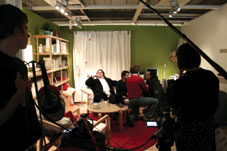
Ulf Aminde
Welcome Home
Video installation | dv | color | 12:0 | Germany, Belgium | 2006
Just imagine: you're shopping in IKEA and suddenly you're asked to take part in a film. This is what happened to more than a hundred customers in the IKEA store in Wilrijk, Belgium, where Aminde was on location for two weeks to film "Welcome Home". In the ready-made scenes - the student's room, the rustic living room, the designer interior - the customers could improvise at will in specified situations. There was a great willingness to participate among the would-be actors. We see people sleeping, cooking, sitting down? "Welcome Home" is a compilation of humorous scenes based on the confrontation of artificiality versus authenticity, man versus the market. IKEA functions as a clearly recognizable setting for these scenes and conjures up all sorts of associations and reflections. However, Aminde doesn't make any explicit statements on consumerism and globalization. To him it's more important to simply let the people play and allow us to watch.
Ulf Aminde (was born in 1969, Germany) lives and works in Berlin as a video artist. His work was exhibited in Centre Culturel de Suisse (Paris), Friedericianum (Kassel), and Kagami (Paris), to name but a few. In 2004 he had a solo exhibition "Survival of the Fittest in Wolfsburg", and in 2006 his work was shown at the Berlin Biennale. Ulf is mostly interested in the socio-emotional mechanisms of capitalist society. Instead of merely recording, he seeks out the participation of people or groups with a social stigma, people that cannot or will not participate in our welfare society. Ulf does not condemn nor complain, but his work shows these people in such a way that our common perception of them is shattered, or at the very least becomes more nuanced.
Tal Amiran
Catalogue : 2008Untitled (band in a studio) | Art vidéo | dv | color | 2:23 | United Kingdom | 2006
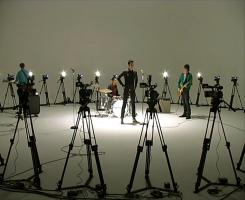
Tal Amiran
Untitled (band in a studio)
Art vidéo | dv | color | 2:23 | United Kingdom | 2006
A rock band is filmed in a studio during the making of a music video. The set for the video consists of numerous video cameras with their lights on, arranged in a circle. The circle of lights forms a ring and within that ring the band is situated. In the second scene, a performer comes in and out of the frame as he plays his guitar frenetically. The last scene shows the band waiting, looking bewildered. At the centre of the work is the uncertainty we feel in regard to what we see, as the footage documents a real activity which at the same time remains inexplicable. The video is silent. Sound and music are a central and inseparable part of a rock band?s performance, and as such, the muted sound instigates an uncanny experience and conveys a new reading to the scenes. The camera/observer is placed in a neutral standpoint, dictating a sense of detachment and alienation. The relationship between documentary and fiction, stillness and movement, euphoria and melancholy, and sound and silence, are at the core of this work.
Born Tel Aviv, Israel. Tal Amiran is both a video artist and a professional musician and is currently a member of signed punk rock London band Vatican DC. In 1989 he completed his Fine Art studies in Thelma Yellin school of Art in Tel Aviv, Israel, with a Certificate of Excellency. In 2006 he graduated from Chelsea College of Art and Design London, with a First Class Honours in BA Fine Art (New Media). Since graduating, Amiran`s video works have been shown extensively: The International Video Art Festival in Iceland, The 12th International Media Art Biennale in Poland, `The Bigger Picture` in Manchester UK, ?Future Map? ? University of the Arts? new talents showcase, amongst others. Amiran lives and works in London, UK
Cristina Amiran, Khalil Charif
Catalogue : 2008AVENUE | Art vidéo | dv | color | 3:16 | Brazil | 2006
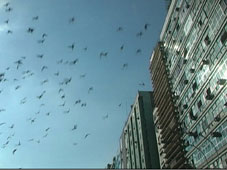
Cristina Amiran, Khalil Charif
AVENUE
Art vidéo | dv | color | 3:16 | Brazil | 2006
During the process of investigation of relationships between cinema, photography, and video art, the authors have been working global-local themes. Presenting in this video a one-shot view of Copacabana (empty of people and cars) like a flying journey into an avenue.
Cristina AMIRAN was born in Rio de Janeiro in 1960, and lives and works there. She has a B.A. in Visual Communication (1988) and has studied art at the Escola de Artes Visuais do Parque Lage (2003-2005). Khalil CHARIF, also from Rio de Janeiro (1967), has an A.A degree in Art History (2004) and is a B.A. in Architecture (1995); and has attended EAV Parque Lage (2003-2005) as well. They have been working independently and in group projects. Their exhibitions include: "Lusovideografia", Oi Futuro, Rio de Janeiro, 2007. "VideoLab Coimbra 2006", TAGV / Universidade de Coimbra, Portugal, 2006. "Posição 2004", EAV Parque Lage, Rio de Janeiro, 2004.
Annabelle Amoros
Catalogue : 2014Welcome to My World | Video | dv | color | 9:25 | France, USA | 2013
Annabelle Amoros
Welcome to My World
Video | dv | color | 9:25 | France, USA | 2013
La vidéo Welcome to My World représente Woolstock un petit village, extrêmement isolé au centre des .États-Unis, dans l?Iowa. Comme dans beaucoup d?autres lieux de ce type, il ne se passe rien. Les habitants sont enfermés dans un quotidien calme, épuré, et serein, mais peut être aussi ennuyeux et répétitif. Les scènes sont tournées dans des paysages contemplatifs. Elles représentent des atmosphères nocturnes et crépusculaires, éclairées par la lumière incertaine des lampadaires et nous plongent dans un univers étrange, où nous attendons quelque chose que nous ignorons et qui nous échappe.
Annabelle Amoros est née en 1987 à Creil. Après avoir suivit une formation à l`École Supérieure d`art de Metz, elle poursuit aujourd`hui ses études à l`École Nationale Supérieure de la Photographie d`Arles. Suite à quelques voyages l`ayant menée au centre des États-Unis, en Finlande, en Laponie, sans oublier la France, elle ne cesse d`observer et de s`imprégner de la vie quotidienne des gens installés dans des petits villages très isolés. Elle tente de transformer les habitants en personnages et de créer des univers sous tension à partir d`un quotidien où il ne se passe presque rien. Par l`outil photographique ou vidéographie, elle ne cesse d`interroger ses images autour de la dualité réalité-fiction.
Thom Andersen
Catalogue : 2011Get Out of the Car | Experimental doc. | 16mm | color | 34:0 | USA | 2010

Thom Andersen
Get Out of the Car
Experimental doc. | 16mm | color | 34:0 | USA | 2010
From the director of "Los Angeles Plays Itself" comes another city symphony exploring Los Angeles' gentrification through a thoughtful montage of façades and a playful excursus through its musical history.